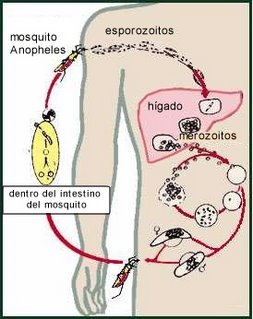New type of vaccine against Malaria.

American scientists are developing a new vaccine type against Malaria that blocks the development of the illness, while the causing parasite is in the midgut of the mosquito and outside of human beings. To develop the vaccine, were used a human malarial transmission-blocking protein vaccine candidate, after chemical conjugation to the outer-membrane protein complex (OMPC) of Neisseria meningitidis serogroup B and adsorption to aluminum hydroxyphosphate, was the Pfs25 protein. In mice, the Pfs25H-OMPC conjugate vaccine was >1,000 times more potent in generating anti-Pfs25H ELISA reactivity of Plasmodium falciparum. A revolution, because all previous vaccines, acted to the interior of the human organism, with questionable results, because the parasite Plasmodium, escaped to the effects of the immune system, hiding inside red blood and hepatic cells. The new vaccine uses as antigen, recombinant forms of the pPfs25H protein, key element for the development of the parasite during its permanency in the midgut of the mosquito. The proteins were recognized by the immune system of animals and humans vaccinated, with the recombinant form of antigen Pfs25H, beeing successful in mice, when mounting a secondary effective answer, after a single boost of the recombinant form.
Microscopic exams of the midgut of the mosquito showed a total blockade to development of oocysts of Plasmodium (see graphic), in the midgut of the mosquito. This way, when a mosquito bites a vaccinated person, it ingests blocking antibodies to the action of antigen Pfs25H. The scientists said that the vaccine produced higher levels of antibodies, when vaccinated people were examined, 3 to 7 months after the vaccination. According to Elías Zerhouni, boss of National Institute of Health/USA (NIH), the vaccine can eliminate the malaria of all geographical regions. However, Ron Behrens, expert in malaria of London School of Hygiene Tropical and Medicine, said that the potential problem with the vaccine was that it could protect to communities, but not to the vaccinated individual: "up to now the vaccines have offered the individual some protection form....in this case the individual has made the sacrifice, to protect to his community and this can turn difficult the sale of the vaccine." The investigators said that the vaccine could also be effective against other forms of Malaria, including parasite P. vivax.
Microscopic exams of the midgut of the mosquito showed a total blockade to development of oocysts of Plasmodium (see graphic), in the midgut of the mosquito. This way, when a mosquito bites a vaccinated person, it ingests blocking antibodies to the action of antigen Pfs25H. The scientists said that the vaccine produced higher levels of antibodies, when vaccinated people were examined, 3 to 7 months after the vaccination. According to Elías Zerhouni, boss of National Institute of Health/USA (NIH), the vaccine can eliminate the malaria of all geographical regions. However, Ron Behrens, expert in malaria of London School of Hygiene Tropical and Medicine, said that the potential problem with the vaccine was that it could protect to communities, but not to the vaccinated individual: "up to now the vaccines have offered the individual some protection form....in this case the individual has made the sacrifice, to protect to his community and this can turn difficult the sale of the vaccine." The investigators said that the vaccine could also be effective against other forms of Malaria, including parasite P. vivax.
Nuevo tipo de vacuna, contra la malaria.
Cientificos americanos están desarrollando un nuevo tipo de vacuna contra la Malaria, que bloquea el desarrollo de la enfermedad, mientras el parásito causante de la enfermedad está en el intestino del mosquito y fuera del ser humano. Una revolución, porque todas las vacunas anteriores, actuaban al interior del organismo humano, con resultados cuestionables, porque el parásito Plasmodium, escapaba a los efectos del sistema inmune, ocultándose en el interior de glóbulos rojos y células hepáticas. La nueva vacuna emplea como antigeno formas recombinantes de la proteina Pfs25, elemento clave para el desarrollo del parásito durante su permanencia en el intestino del mosquito. Para desarrollar la vacuna, un candidato a vacuna bloqueadora de la trasmision de la malaria, despues de una conjugacion quimica al complejo de proteinas de la membrana externa (OMPC) de Neisseria meningitidis serogrupo B y adsorption a aluminum hydroxyphosphate, fue la proteina Pfs25. En ratones, el conjugado antigenico de vacuna Pfs25H-OMPC fue >1,000 veces mas potente en generar reactividad anti-Pfs25H ELISA, que una dosis similar : 0.5-μg de Pfs25H sola en Montanide ISA720, un adyuvante agua/aceite. Las proteinas reconocidas por el sistema inmune de animales y humanos vacunados con la forma recombinante del antigeno Pfs25H, fueron exitosas en ratones, al montar una respuesta secundaria efectiva, después de una sola inyección del antigeno recombinante.
Exámenes microscópicos del intestino del mosquito demostraron un bloqueo total al desarrollo de oocistos de Plasmodium, en el intestino del mosquito. De este modo, cuando un mosquito muerde a una persona vacunada, ingiere anticuerpos bloqueadores a la acción del antigeno Pfs25. Los cientificos dijeron que la vacuna producia niveles más altos de anticuerpos, cuando las personas vacunadas eran examinadas, 3 a 7 meses después de la vacunación. Según Elias Zerhouni, jefe del Nacional Institute of Health/USA (NIH), la vacuna puede eliminar la malaria de todas las regiones geográficas. Sin embargo, Ron Behrens, experto en malaria del London School of Hygiene and Tropical Medicine, dijo que el problema potencial con la vacuna era que podia proteger a las comunidades, pero no al individuo vacunado: "hasta ahora las vacunas han ofrecido al individuo solo alguna forma de protección" "en este caso el individuo ha hecho el sacrificio, para proteger a su comunidad y esto puede tornar difícil, la venta de la vacuna". Los investigadores dijeron, que la vacuna también podria ser efectiva contra otras formas de parásito incluido el P. vivax.



.+Photo+Author.jpg)



0 Comments:
Post a Comment
<< Home